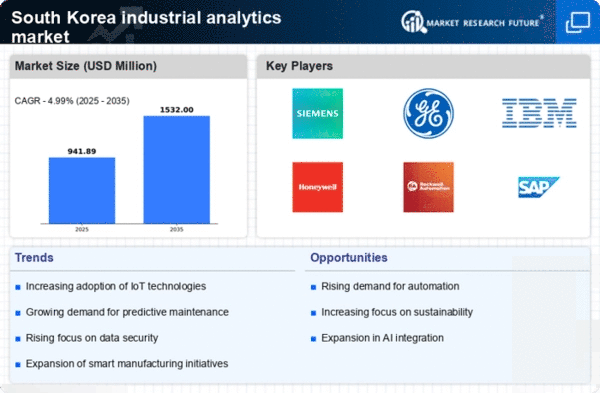Investment in Advanced Technologies
Investment in advanced technologies significantly propels the industrial analytics market in South Korea. Companies are channeling resources into cutting-edge technologies such as machine learning, IoT, and big data analytics to enhance their operational capabilities. According to recent data, the technology sector in South Korea is projected to allocate over $10 billion towards digital transformation initiatives by 2026. This influx of capital fosters the development of sophisticated analytics solutions that can process vast amounts of data in real-time. As a result, organizations can derive actionable insights that lead to improved productivity and reduced operational costs. The emphasis on technological advancement is likely to create a robust ecosystem for the industrial analytics market, driving further innovation and adoption.
Regulatory Compliance and Standards
Regulatory compliance and standards play a crucial role in shaping the industrial analytics market in South Korea. As industries face increasing scrutiny regarding data security and operational transparency, the demand for analytics solutions that ensure compliance with local regulations intensifies. The South Korean government has implemented stringent data protection laws, compelling organizations to adopt analytics tools that can monitor and report compliance metrics effectively. This regulatory landscape is expected to drive a growth rate of approximately 12% in the adoption of compliance-focused analytics solutions. Consequently, the industrial analytics market is likely to expand as businesses seek to mitigate risks associated with non-compliance while enhancing their operational integrity.
Focus on Sustainability and Efficiency
The industrial analytics market in South Korea is increasingly influenced by a focus on sustainability and efficiency. Organizations are under pressure to reduce their environmental footprint while maintaining productivity. Analytics solutions that provide insights into energy consumption, waste management, and resource optimization are becoming essential. Recent studies indicate that companies utilizing analytics for sustainability initiatives can achieve up to a 20% reduction in energy costs. This growing emphasis on sustainable practices not only aligns with global environmental goals but also enhances corporate reputation. As a result, the industrial analytics market is likely to witness heightened demand for solutions that support sustainable operations, driving innovation and investment in this area.
Collaboration and Partnerships in Technology
Collaboration and partnerships among technology providers and industrial players are emerging as a key driver for the industrial analytics market in South Korea. Companies are increasingly forming alliances to leverage complementary strengths and accelerate the development of innovative analytics solutions. This trend is reflected in the establishment of joint ventures and strategic partnerships aimed at enhancing data analytics capabilities. For instance, recent collaborations between software firms and manufacturing companies have led to the creation of tailored analytics platforms that address specific industry needs. Such partnerships are expected to foster a more dynamic industrial analytics market, enabling faster adoption of advanced technologies and driving competitive advantage for participating organizations.
Increased Demand for Data-Driven Decision Making
The industrial analytics market in South Korea experiences a notable surge in demand for data-driven decision making. Companies are increasingly recognizing the value of leveraging data analytics to enhance operational efficiency and optimize production processes. This trend is evidenced by a reported growth rate of approximately 15% in the adoption of analytics solutions across various sectors, including manufacturing and logistics. As organizations strive to remain competitive, the integration of advanced analytics tools becomes essential. This shift not only aids in identifying inefficiencies but also facilitates predictive maintenance, thereby reducing downtime and operational costs. Consequently, the industrial analytics market is poised for substantial growth as businesses prioritize data-centric strategies to drive performance and innovation.
















